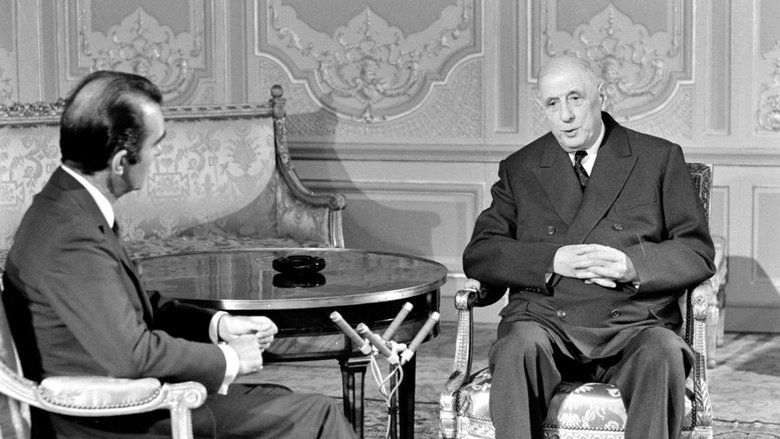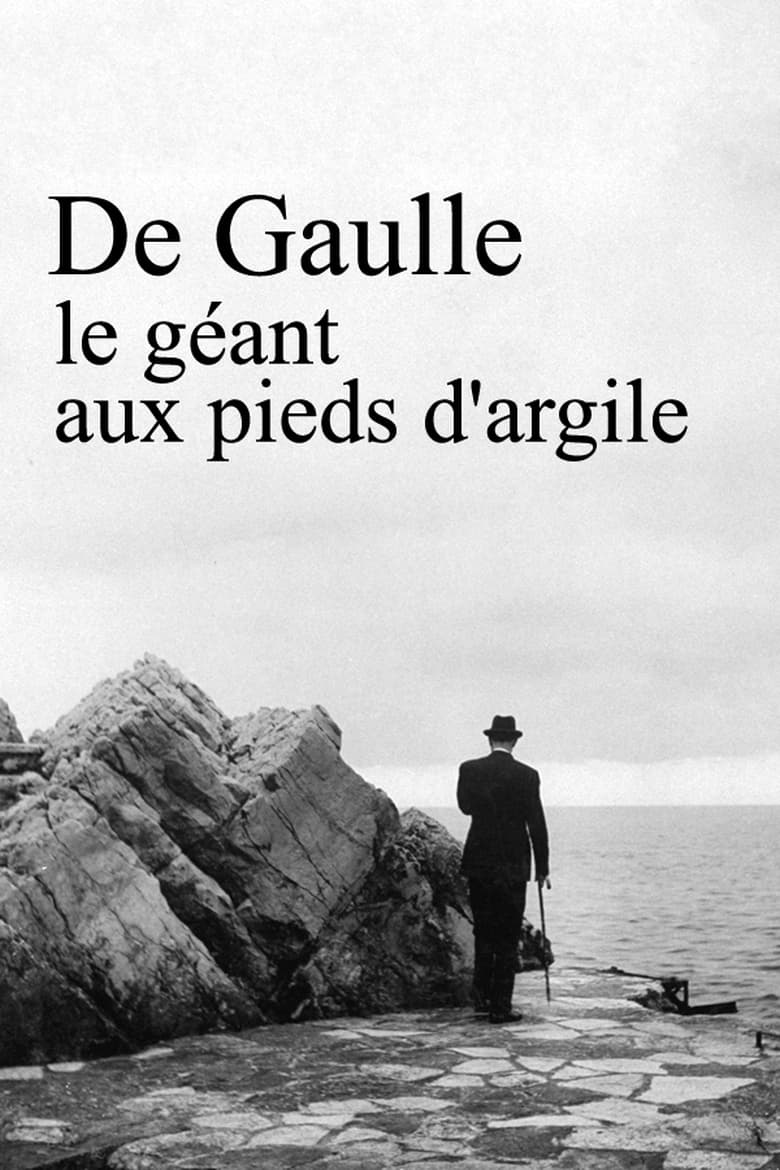

De Gaulle, le géant aux pieds d'argile
Genres
Overview
Details
Budget
$0
Revenue
$0
Runtime
84 min
Release Date
2012-06-12
Status
Released
Original Language
French
Vote Count
1
Vote Average
9
Christine Gagnieux
Narrator (voice)
Charles de Gaulle
Self (archive footage)
Michel Droit
Self (archive footage)
Winston Churchill
Self (archive footage)
Pierre Boisson
Self (archive footage)
Philippe Pétain
Self (archive footage)
William D. Leahy
Self (archive footage)
Franklin D. Roosevelt
Self (archive footage)
Émile Muselier
Self (archive footage)
Philippe de Gaulle
Self (archive footage)
François Darlan
Self (archive footage)
Henri Giraud
Self (archive footage)
André Malraux
Self (archive footage)
Antoine Pinay
Self (archive footage)
François Mitterrand
Self (archive footage)
0.0
Leipziger Messe 1946
Documentary short about the Leipzig Tradefair in 1946.
1946-12-01 | de
0.0
Dresden
A film about Dresden - before, during, and after the war.
1946-09-14 | de
5.9
M/S Gustloff
Joseph Vilsmaier Two-part TV movie focuses on the tragic events surrounding the sinking of the Wilhelm Gustloff, a German passenger ship, at the end of World War II. On 30 January 1945, Captain Hellmuth Kehding was in charge of the ship, evacuating wounded soldiers and civilians trapped by the Red Army. Soon after leaving the harbor of Danzig, it was hit by three torpedoes from the Soviet submarine and sank in less than an hour.
2008-03-02 | de
0.0
The Final Days of Adolf Hitler
2024-06-20 | fr
7.1
We Were Soldiers
The story of the first major battle of the American phase of the Vietnam War and the soldiers on both sides that fought it.
2002-03-01 | en
8.1
The Best of Youth
After a fateful encounter in the summer of 1966, the lifepaths of two brothers from a middle-class Roman family diverge, intersecting with some of the most significant events of postwar Italian history in the following decades.
2003-06-22 | it
7.3
The Enigma of Kaspar Hauser
The film follows Kaspar Hauser, who lived the first seventeen years of his life chained in a tiny cellar with only a toy horse to occupy his time, devoid of all human contact except for a man who wears a black overcoat and top hat who feeds him.
1974-11-01 | de
7.4
Selma
"Selma," as in Alabama, the place where segregation in the South was at its worst, leading to a march that ended in violence, forcing a famous statement by President Lyndon B. Johnson that ultimately led to the signing of the Voting Rights Act.
2014-12-25 | en
6.1
Stonewall
Kicked out by his parents, a gay teenager leaves small-town Indiana for New York's Greenwich Village, where growing discrimination against the gay community leads to riots on June 28, 1969.
2015-09-18 | en
0.0
U-505: Extend the Experience
This video invites you inside the U-505 submarine, the actual craft that stalked the waters of the Atlantic before it was blown to the surface and captured on June 4, 1944. This immersive video reveals the technology and life aboard this sub in the days leading up to her capture. Among the many highlights, you’ll see crewmen bunks and the galley, wedged in among the mechanical workings of the sub.
2006-10-01 | en
5.6
Saltwater: The Battle for Ramree Island
During the last desperate months of World War II, an Allied mission to regain Ramree Island off the coast of Burma ends in horror when an embattled group of soldiers find themselves trapped in dense swampland infested with deadly saltwater crocodiles. As the men are picked off one by one by the hungry reptiles, those that remain resort to increasingly desperate measures to survive the onslaught of carnage and get off the island alive.
2021-06-01 | en
7.5
The Revenge of Bernadette Chirac
2023-10-08 | fr
2.4
Dead Weekend
In the midst of an evacuation effort, True World Forces agent Weed must secure an alien spacecraft suspected to have crashed somewhere in the city. But after Weed meets the ship's beautiful, shape-shifting pilot, he finds himself falling for her. As the two grow close, Weed struggles to determine where his true loyalties lie.
1995-10-08 | en
0.0
The Fighting Liberator
Here is the hair raising, seat-of-the-pants tale of men who dared to fly their planes, unescorted, to the heart of enemy held Romania to blast the source of German oil. It's also the story of long, low level flights over water, searching for the tell tale sliver of a U-boat periscope. It's a tribute to an underdog that became the most versatile, widely used bomber of World War II. This is THE B-24 LIBERATOR! Aviation A.V. Library brings you this battling classic in a hell-raising video adventure that we call "THE FIGHTING LIBERATOR." From the Bismark Sea to dirt airstrips in China to the exhilaration of the great push on D-Day the Liberator was there, fighting her way over, around and through the Axis ranks.
1994-01-01 | en
6.7
Days of Glory
1943. They have never stepped foot on French soil but because France was at war, Said, Abdelkader, Messaoud and Yassir enlist in the French Army, along with 130,000 other “indigenous” soldiers, to liberate the “fatherland” from the Nazi enemy. Heroes that history has forgotten…
2006-09-27 | fr
6.0
Mr. Kingstreet's War
A couple sets up an African game preserve, only to have British and Italian armies fight over the waterholes.
1973-05-01 | en
6.5
The Cardinal
A young Catholic priest from Boston confronts bigotry, Nazism, and his own personal conflicts as he rises to the office of cardinal.
1963-12-12 | en
8.0
The Nuremberg Trials
One journalist described it as a chance "to see justice catch up with evil." On November 20, 1945, the twenty-two surviving representatives of the Nazi elite stood before an international military tribunal at the Palace of Justice in Nuremberg, Germany; they were charged with the systematic murder of millions of people. The ensuing trial pitted U.S. chief prosecutor and Supreme Court judge Robert Jackson against Hermann Göring, the former head of the Nazi air force, whom Adolf Hitler had once named to be his successor. Jackson hoped that the trial would make a statement that crimes against humanity would never again go unpunished. Proving the guilt of the defendants, however, was more difficult than Jackson anticipated. This American Experience production draws upon rare archival material and eyewitness accounts to recreate the dramatic tribunal that defines trial procedure for state criminals to this day.
2006-01-30 | en
0.0
Macht
Thriller about the kidnapping of a famous politician and his dirty past.
1998-09-13 | de
6.1
Evita
The hit musical based on the life of Evita Duarte, an Argentinian actress who eventually became the wife of Argentinian president Juan Perón, and the most beloved and hated woman in Argentina.
1996-12-14 | en